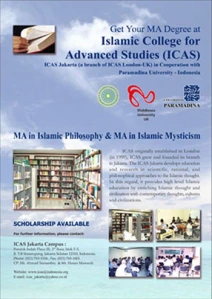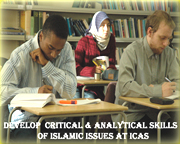COURSE OUTLINE of LOGIC 1
| College | ICAS |
| Degree | M.A. |
| Course Title | Logic I |
| Course Code | |
| Status | |
| Level | Postgraduate |
| Credit Hours | |
| Contact Hours | |
| Pre-requisites(if any) | – |
| Co-requisites(if any) | – |
| Teaching Methodology | The course will start by narration in such a way that the students do not study logic in an isolated world or in a backward way but in the way that they must know logic in our own age along with its problems and criticism. Bringing up actual and contemporary issues, the course will be enriched by daily life examples and illustration |
| Method of Evaluation | |
| Lecturer | |
| Semester Offered | |
| Course Objectives
|
|
| Learning Outcomes | |
| Course Synopsis (course description)
|
This course is presented to introduce the importance, definition, subject matters, history, scope, and benefits of logic for scientific enterprise and life of human being in general. |
WEEKLY PLANNER, TOPICS AND READINGS
| Week | Topics | Description of the Topics | Recommended Readings |
| 1 | Introduction | – The narration of the importance of logic- The explanation of the definition, subject matters, and scope of logic
– The narration of the purpose and benefits of studying logic – The narration of history of logic, its development up to now, the types of logic (traditional/formal logic, symbolic logic, propositional logic) – The overview and clarification of criticism of universal principles of logic |
|
| 2 | Fundamental laws of thought and the applications | – The elaborate explanation on three fundamental and universal laws of thought of human being (Prima Principia): The Principle of Identity, The Principle of Non-Contradiction, and The Principle of Excluded Middle- The exposition of the role and function of logic in human knowledge (Sciences, Philosophy, Religion)
– Philosophical reflection on thinking – Thinking and reasoning (cognitive psychological approach) |
|
| 3 | Conceptions, Assents, and Inferences | – The description of three subject mattes of logic: conception (tasawwur), assent (tasdiq), and inference (istidlal), which respectively related to study of terms and definition, proposition, and argument (hujjah).- The description of the meaning of knowledge
– The division of knowledge into knowledge by presence and knowledge by correspondence – The division of knowledge by correspondence into conception and assent – The delineation of the process of intellection of human mind – The explanation of abstraction (tajrid) and universalisation (ta’mim) – The exposition of assent – The exposition of argument along with its types (syllogism, induction, analogy) |
|
| 4 | Terms and Definition | – The analysis of words (expressions) and terms along with its kind, classification (univocal, equivocal, analogue; single-composite, connotation-denotation, particular-universal, etc)- The explanation of the predication and categories
– The exposition for modes of relation (nisab al-arba’ah) and the five universal terms (kulliyat al-khamsah) – The explanation the way of making definition along with its kinds and levels |
|
| 5 | Proposition | – The analysis of proposition (a discussion on dispute of the number of components of proposition: three or four (subject, predicate, relation and judgment)- The delineation of the differences of categorical proposition (qadiyah hamliyyah) and hypothetical proposition (qadiyah shartiyyah) along with their kinds respectively
– The explanation of the traditional square of opposition along with its laws – The exposition of some immediate inferences from single proposition |
|
| 6 | Inferences | – The description and explanation of types of reasoning as well the nature and ways of inferences- The explanation of some kinds of immediate inferences (conversion, obversion, contraposition)
– The exposition of mediate inferences |
|
| 7 | Argument | – The description and explanation of types of argument (deduction, induction and analogy)- The explanation of syllogism as a most famous type of deductive reasoning
– The exposition of two types of syllogism (categorical and hypothetical) – The delineation of inductive reasoning – The explanation of analogy |
|
| 8 | Five Forms of Syllogism | – The description and explanation on the five forms of syllogism (Sina’at Al-Khamsah): demonstration, dialectic, rhetoric, poetry, sophistry- The explanation of the characteristics of demonstration as the most reliable form of argument
– The explanation of the characteristics of dialectic (jadal) – The explanation of the characteristics of rhetoric (khutbah) – The explanation of the characteristics of poetry (shi’r) – The explanation of the characteristics of sophistry (mughalatah) as the fallacious syllogism |
|
| 9 | Propositional Logic | – The description and explanation propositional logic as a form of symbolic logic- The explanation of five logical function of propositional logic (negation, conjunction, disjunction, implication, equivalence)
– The delineation of the truth functions along with the truth tables – The explanation a natural deduction in propositional logic |
|
| 10 | Modal Logic | – The description and explanation of the matters and modes of proposition as a subject matter of modal logic- The explanation of modal logic as a kind of logic which is closely related to the issues of metaphysics
– The description of three modalities of proposition: necessity, possibility and impossibility – The explanation of the meaning of necessity and possibility – The explanation of the differences of possibility and probability |
|
| 11 | |||
| 12 |
Note:
REFERENCES
- Sheikh Muhammad Rida Muzaffar, Al-Mantiq, Qum, 1383 H
- ‘Abdul Hadi Fadl, Khulasatul Mantiq, Qum, 1383
- Shahid Murtada Mutahhari, Ashnai ba Ulume Islami, Jilid Awwal Duruse Mantiq wa Falsafah, Qum
- Sheikh Rais Ibn Sina, Isharat wa Tanbihat, Juz Awwal: Mantiq, Qum, 1375
- _________________, Remarks and Admonitions, Part One: Logic (English edition, translated by Shams C. Inati, Toronto, 1984)
- _________________, Ash-Shifa, Vol. 7-10 (six parts: madkhala, maqulat, ‘ibarah, qiyas, burhan, safsatah)
- _________________, An-Najah (Juz 1-3: Mantiq), Tehran, 1364
- Abu Nasr Al-Farabi, Al-Alfaz al-Musta’malah fi-l Mantiq, (edited by Muhsin Mahdi), Az-Zahra publishers, Qum, 1404 H.
- Mulla Sadra, al-Tanqih fi-l Mantiq, SIPRIn, Tehran
10. Irving M. Copi and Carl Cohen, Introduction to Logic, New York-London, 1990
11. Patrick J. Hurley, A Concise Introduction to Logic, Wadsworth,California, 2003.
12. Graham Priest, Logic: A Very Short Introduction, Oxford, 2000
13. Jonathan Barnes (ed.), The Complete Works of Aristotle (Volume One: Categories, De Interpretatione, Prior Analytics, Posterior Analytics, Topics, Sophistical Refutations), New Jersey, 1984
14. J.l. Ackrill (ed.), A New Aristotle Reader (on Logic parts), Princeton University Press, New Jersey, 1987.
15. Sir David Rose, Aristotle, London, 1966.
16. Richard McKeon, Introduction to Aristotle, New York, 1947.
17. Immanuel Kant, Lectures on Logic, Cambridge University Press, Cambridge, 1992.
18. Peter Smith, An Introduction to Formal Logic, Cambridge, 2003
19. Daniel Bonevac, Simple Logic, Oxford, 1999.
20. Ronald c. Pine, Essential Logic, Oxford, 1996
21. Paul Herrick, The Many Worlds of Logic, Oxford, 2004
22. Murtada Mutahhari, Pengantar Logika (dalam Pengantar Ilmu-Ilmu Islam), Jakarta, 2003.
23. R.G. Soekadijo, Logika Dasar: Tradisional, Simbolik, dan Induktif, Gramedia, Jakarta, 2003.
24. E. Sumaryono, Dasar-Dasar Logika, Kanisius, Yogyakarta, 1999.
25. H. Mundiri, Logika, RajaGrafindo, Jakarta, 2002
26. I.R. Poedjawijatna, Logika: Filsafat Berpikir, Rineka Cipta, Jakarta, 2002
27. Alex Lanur, Logika Selayang Pandang, Kanisius, Yogyakarta, 1983
28. Gorys Keraf, Argumentasi dan Narasi, Gramedia, Jakarta, 2004
29. Tan Malaka, Madilog, Jakarta, 2004
30. Taib Thahir, Ilmu Mantiq, Penerbit Widjaya, Jakarta, 1987.
31. H.M. Joesoef Sou’yb, Logika: Hukum Berpikir Tepat, Pustaka Al-Husna, Jakarta, 1983.
32. Jujun S. Suriasumantri (editor), Ilmu dalam Perspektif, Yayasan Obor Indonesia, Jakarta, 1995
33. Muhammad Baqir Sadr, Asasiyyat-ul Mantiq Istiqra, Najaf
34. ‘Askari Sulaimani Amiri, Mi’yar Andisheh, Markaz Muassasah Amuzesh Imam Khumaini, Qum, 1384
35. Hasan Ahmad Shahrudi, Sharh Mantiq (Jilid Awwal:At-Tasawwurat),Qum,1382.
36. ___________________, Sharh Mantiq (Jilid Dum: At-Tasdiqat), Qum, 1382.
37. Muhammad Ali Ejeii, Mabone Mantiq (The Elements of Logic), Tehran, 1381
38. Sayyid Ali Asghar Khandan, Mantiq Gorberdi (Practical Logic), Tehran 1379
39. Ali Asgar Xandan, Mogaletat, Qum, 1380
40. Mahmud Montazeri Muqaddam, Mantiq, Qum, 1380
41. Maula ‘Abdullah Ibn Shihabuddin Husain Yazdi, Al-Hashiyah fi Tahdzibul Mantiq li at-Taftazani, 1415 H
42. Lewis Vaughn, The Power of Critical Thinking, Oxford, 2005
43. Keith J. Holyoak and Robert G. Morrison (eds.), Thinking and Reasoning, Cambridge, 2005.
44. David J. Crossley and Peter A. Wilson, How to Argue, An Introduction to Logical Thinking, New York, 1979
45. S. Cannavo, Think to Win, Promotheus-New York, 1998
46. Alec Fisher, Critical Thinking: An Introduction, Cambridge, 2001
47. S.B. Abed, Aristotelian Logic and the Arabic Language in Al-Farabi, New York, 1994.
48. Shams Inati, Logic, in History of Islamic Philosophy Part II (edited by Seyyed Hossein Nasr and Oliver Leaman), Ansariyan Publications, Qum, 2001.
49. S.M. Musawi (editor), Philosophical Selections from Encyclopedia of Islam, ICAS Jakarta, 2007.
50. Barry K. Beyer, Practical Strategies for The Teaching of Thinking, Boston, 1987
51. Richard H. Popkin and Avrum Stroll, Philosophy Made Simple (Chapter 6: Logic), New York, 1993





 http://ic-jakarta.org/
http://ic-jakarta.org/








Dear SHeikh
Salam alaykum
I teach traditional logic online thru our Instutute. Please share with me your text in English if any. I also teach Nazariyatul Marifah and have a text in English. Please call me if you can 001-214-454-7860
Jazakallah
Shamshad Haider